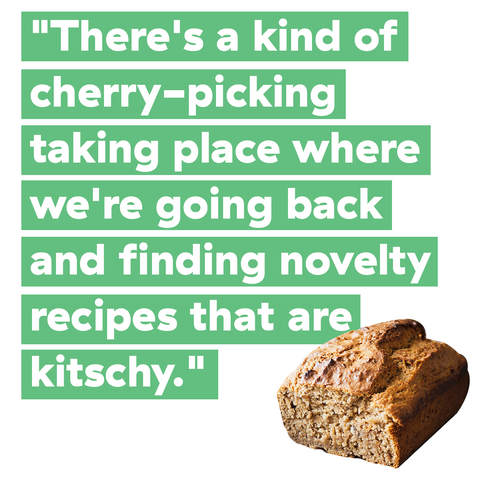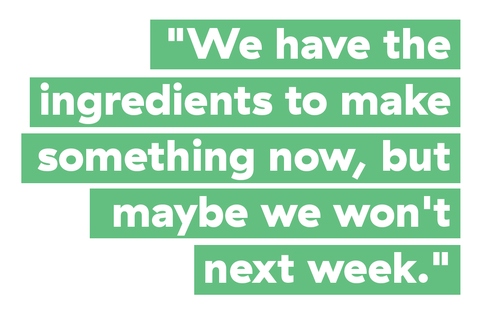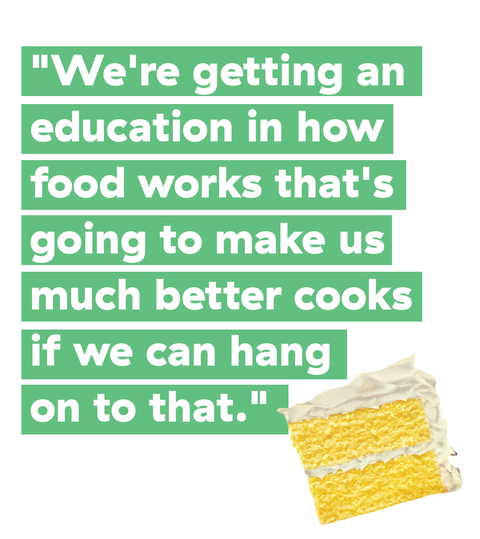Recipes From The Great Depression Era Are A Fun Way To Remember The Past
They say trends are cyclical, but they would have had to be looking into a crystal ball to predict something called “depression cake” becoming popular again in 2020. Alas, here we are—stuck at home, whipping milk for strangers’ applause on TikTok, boldly trying out new self-tanners without a care in the world about the repercussions, and baking cakes that hearken back to the days when our grandparents were our age.
Maybe you’ve heard it called something other than depression cake —poor man’s cake, war cake, wacky cake, crazy cake. They’re all the same milkless, eggless, butterless treat borne out of necessity and a lack of access to basic ingredients. And now, under stay-at-home orders and with panic-buying bringing us back to a freakishly familiar place, bakers have commandeered the 90-something-year-old cake and taken to calling it “quarantine cake.”
“I came across a recipe for crazy chocolate cake, aka chocolate depression cake, a while back, and I tweaked it,” Emily Hutchinson, creator of The Hutch Oven blog and judge on Hallmark Drama’s Christmas Cookie Matchup, explains. “I got it to where it was worthy of sharing with my family, and they couldn’t believe how delicious it was with no eggs, milk, or butter.” So Emily kept baking it and kept sharing it with friends. Then, when the quarantine hit, Emily’s friend Christina convinced her to share the recipe with a bigger group of friends—her 116,000 Instagram followers.
She posted a video of the recipe, calling it quarantine cake on March 21. The likes and the views immediately rolled in, but so did the messages and the memories, Emily says: “The older generation of my followers, whom I adore, kept thanking me because some had lost their recipes for cake similar to mine or they couldn’t find their mother’s or grandmother’s recipe.”
Interest is piquing in more than just Emily’s little corner of the internet, though, and data from Google would suggest you’ve tried your hand at baking a depression cake—or you’ve at least been curious. Searches for “depression cake” are up 60 percent over the past month, right around the time states began shutting down. Pinterest has been overrun with similar desperate times call for staple-less recipes searches, too. Queries for “yeastless bread recipes” are up 4,400 percent and terms like “no egg cake recipe” and “canned ham recipes” are trending worldwide.
But all this digging for old-school, Depression Era recipes doesn’t indicate an absolute regression to 1930s cooking. It’s more like a game—like the results of a BuzzFeed quiz entitled “Tell Us Your Food Preferences, And We’ll Tell You Which Decade You Actually Should Have Lived In And A Recipe To Make Tonight.”
We’re cooking from the highlight reel; we’re looking for the outliers, shareable recipes that still have a pretty decent chance of tasting, well, decent, says Jane Ziegelman, author of A Square Meal: A Culinary History of the Great Depression. “There’s a kind of cherry-picking taking place where we’re going back and finding novelty recipes that are kitschy in a way. And we feel like it’s almost fun to go back and cook these historical recipes.”
Then there’s the flip side of the fun: our anxiety that the food scarcity and rationing that were prevalent during the Great Depression will return. We’re not there yet, but online grocery orders remain difficult to fulfill, brand giants warn the entire food chain is about to break, and a partial collapse of the restaurant industry seems imminent—if it hasn’t already happened.
“We’re finding ways to cope with it,” Jane says, “and one way is to kind of practice. We have the ingredients to make something now, but maybe we won’t next week. And this isn’t totally in the level of our consciousness, but we’re wondering how we’re going to do it if we don’t get whatever we need to make, say, an actual loaf of bread.”
Enter: Reddit, a millennial’s favorite coping mechanism. About a month ago, a recipe for peanut butter bread reemerged on the platform. It’s a loaf of bread that calls for only five ingredients, none of which are butter, eggs, or yeast. The recipe was originally published in the 1932 Five Roses Cook Book from Canadian flour company Five Roses. In July 2019, Glen Powell (of the YouTube channel Glen & Friends Cooking) spotlighted it in an episode of his “Old Cooking Show,” a series he started after opening an old box of cookbooks from his grandparents.
Hundreds of posts about it—with thousands of upvotes—now live on Reddit, mostly praising the recipe, sometimes poking fun at the whole thing. Ironically, Glen can’t participate in the conversation, nor is he seeing any kickback in views from the recent spike in interest. He’s been banned from any recipe-related subreddits, you see, after his YouTube video about making the OG recipe for Coca-Cola (yes, the Coca-Cola—Glen found the instructions in his stack of old cookbooks) landed on Reddit one too many times. “They banned any content from my channel because they said I was getting people to [post the video too many times],” Glen laughs. So the only thing you’ll find that points the peanut butter bread recipe back to Glen & Friends Cooking is a description of the video, copied and pasted from the YouTube channel.
Still, Glen gets the appeal of it all…even if he can’t comment back letting people know as much: “With the current COVID-19 pandemic—sheltering in place and social distancing and restaurants being closed—people are looking at it a little more closely, at how we can apply what happened then to what’s happening now,” Glen says.
“I see a lot of make-do recipes in the 1930s cookbooks that are sort of related to [the shortage of ingredients],” Glen continues. He’s got many books with instructions for how to make mock chicken, plus one from Chicago with a recipe for mock possum.
We’re still in the mock bread phase—perhaps an indication that we haven’t completely dived off the deep end quite yet. What’s more: We’re returning to this kind of pure place when it comes to cooking. Sure, you can still get umpteen recipes and stories about what to cook at the click of a button—it’s 2020, lest we need to remind you—but you can also get thousands of Google returns about how to cook now.
“There’s one thing that I’ve seen which is really positive and really encouraging to me,” Jane says. “I’ve seen bunches of articles by food writers that aren’t so much looking at recipes but are trying to teach people basic laws of food and cooking. We’re learning sort of how it all works—how to cook without a recipe, how to keep produce fresh longer, how to make substitutions. We’re getting an education in how food works that’s going to make us much better cooks if we can hang on to that.”
So if nothing else—when the yeast returns and the peanut butter bread goes away for another eight decades, and the eggs aren’t hard to track down anymore so the depression cake goes back into its vault—let’s hang on to that.











